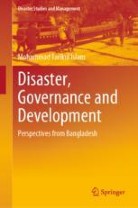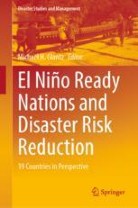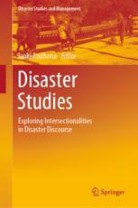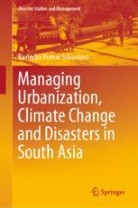
About this book series
- Provides a comprehensive coverage of contemporary issues in disaster management and disaster studies
- Contributes to developing theoretical rigour, linking the fields of disasters, development and climate change adaptation
- Focuses on critical analysis and developing a comparative perspective in disaster management
This book series aims to further academic scholarship and discourse in the rapidly emerging discipline of disaster studies – encompassing both theoretical and practical concerns in the interface between disasters, their conception, their management and their relationship with various aspects of governance. It covers diverse perspectives and approaches, reflected in case studies and narratives from different parts of the world.
The series addresses the growing need to bring together the wealth of dialogue and experiences in disaster research and disaster management. It seeks to enhance the knowledge base explicating the complex relationship between shifting socio-economic situations, unplanned urbanization, environmental degradation, climate variability and change, geological hazards and the threat of epidemics. It adopts both a comparative and a critical perspective influencing the contemporary discourse around disasters, development and the use of appropriate technologies to foster safety, security and sustainability of the planet.
The series is multidisciplinary in its orientation and invites contributions from academicians, policy makers, practitioners, consultants working in the broad field of disaster management desirous of making scholarly contributions. Books in this series would be of interest to students pursuing postgraduate courses and to practitioners and policy makers looking for reflective and critical literature related to disaster governance and development.
Expected contents could be related to but not limited to:
- Theorization in disaster studies: Perspectives and ideological moorings
- Disaster risk reduction, disasters and development
- Critical review of evolution of DM practices in diverse contexts
- Disasters and media, crisis communication, disasters in a hyper-mediated world
- Narrative analysis, ethnography and anthropology in disaster studies
- Education, capacity building in DM
- Climate change adaptation, extreme weather events and disasters
- Cascading disasters or complex emergencies
- Disasters and conflict, involuntary displacement, migration and disasters
- Local and cultural knowledge for disaster preparedness and response
- Critical reflections/analysis on DM as an emerging profession
- Law, governance, human rights and transboundary governance
- Accountability, entitlements and ethics in DM
- Disasters, politics, humanitarian aid
- Globalisation, role of UN and international organizations in DM
- Technological approaches to DM, assessments and mapping
- Health, public health and hospital preparedness (water, sanitation, epidemics)
- DM as pluralist practice: Lessons learnt (pre and post disasters, before and after studies)
- Disaster “recovery” practices (economy, habitats, land use, housing, livelihoods, religious and cultural practices)
- Disasters, exclusion (special groups- caste, class, elderly, disabled, tourists, etc.)
- Data needs and decision making tools in DM, GIS—based approaches to DM
- Disaster logistics and supply chain management
Cover picture: Taken two years after the Indian Ocean Tsunami of 2004, the picture represents the sheer grit of Nicobari tribals, a fiercely independent community of Chaura, a low lying, tiny island in the Andaman and Nicobar Islands of India. Even as the administration evacuated them to temporary shelters on Teressa island for an indefinite period of time, the tribals, tired of waiting for government promises, built their own boats and moved back to their islands. An embarrassed administration was then forced to take note and provide livelihood and other forms of support.
The series has so far published:
- Managing Urbanization, Climate Change and Disasters in South Asia, 2020, authored by Ravindra Kumar Srivastava
- Disaster Studies: Exploring Intersectionalities in Disaster Discourse, 2021, edited by Janki Andharia
- El Niño Ready Nations and Disaster Risk Reduction: 19 Countries in Perspective, 2022, edited by Michael H. Glantz
- Disaster, Governance and Development: Perspectives from Bangladesh, 2023, authored by Mohammad Tarikul Islam
- Electronic ISSN
- 2730-5643
- Print ISSN
- 2730-5635
- Series Editor
-
- Janki Andharia
Book titles in this series
-

-
Disaster, Governance and Development
Perspectives from Bangladesh
- Authors:
-
- Mohammad Tarikul Islam
- Copyright: 2023
Available Renditions
- Hard cover
- Soft cover
- eBook

-
El Niño Ready Nations and Disaster Risk Reduction
19 Countries in Perspective
- Editors:
-
- Michael H. Glantz
- Copyright: 2022
Available Renditions
- Hard cover
- Soft cover
- eBook

-
Disaster Studies
Exploring Intersectionalities in Disaster Discourse
- Editors:
-
- Janki Andharia
- Copyright: 2020
Available Renditions
- Hard cover
- Soft cover
- eBook

-
Managing Urbanization, Climate Change and Disasters in South Asia
- Authors:
-
- Ravindra Kumar Srivastava
- Copyright: 2020
Available Renditions
- Hard cover
- Soft cover
- eBook


